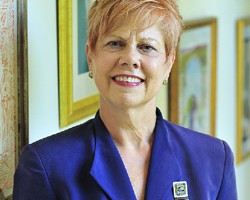Your Financial Future / How To Be An Effective Financial Role Model For Your Children
By Roxanne Fleszar
I recently posted an article on Facebook about a young woman whose grandparents saved $90,000 for her college education and she blew it. That’s right; she went through all of the funds before her senior year. The tuition bill was in her hands and she couldn’t pay it.
This article got a strong reaction from friends and even my sister-in-law. How could this young woman who was given the fabulous gift of a college education blow it?
Well, how did Americans get to the point where we are today with $1.2 trillion in student debt, $901 billion in credit card debt and 5.8 million home foreclosures since September 2008?While there are multiple reasons, lack of ongoing financial education at home is a big one; poor math skills areanother.
Parents who are good role modelsarethe best indicators of financial success for their children.
My mom, a widow at age 40 with four children, went to work as an executive secretary after my dad passed away. There are several important financial lessons that she passed down to us.
Save a portion of every paycheck.Mom had money deducted fromeach paycheck to purchase US savings bonds. Today the better option isan ongoing contribution to youremployer’s retirement plan or an IRA account.
Always have an emergency reserve.Another portion of mom’s paycheck went to a savings account at her bank. She recognized that the unexpected happens. Cars need repairs, appliances fizzle, and unexpected doctors’ appointments come up. Jobs change. As financial advisors, we advise folks to have liquid savings to cover six months of living expenses. If that sounds daunting, start with a goal of saving a minimum of three months of living expenses.
Budget. Oh, I know that word may sound old fashioned but budgeting works. My mom had a small spiral notebook in which she wrote down her fixed expenses monthly. She knew when a major expenditure, like painting the house or putting on a new roof, would be coming up. She put aside some money for that purpose every payday and when she was getting close to the amount she thought she might need, she’d start calling contractors for bids.
Today, a better alternative to a notebook can be found on your phone or computer. There are a good number of financialapps; most of them free, to assist us in getting a handle on our income and expenses. It’s beneficial to see your financial picture in one centralized place; at a glance you can be equipped to make decisions to stay within your budget. Mint.com, doxo.com and ynab.com are three worthwhile programs.
Talk openly about money with your children. My mom wasn’t shy in telling us that we couldn’t have a certain item because it was not in the family budget. Or happily, she had saved enough for a great summervacation. So even when we were young we started to grasp money concepts.
It is reported that children as young as three years old can understand concepts about spending and saving. Researchers at the University of Cambridge, England found that kids’ money habits are formed by age 7!
When children are older, speak frankly about your familyincome and debt.You may feel that discussing money is impolite. In reality, if family money issues are viewed as a secret, your children may feel more anxiety than in knowing the truth. It’s best to use financial discussions as “teachable moments” throughout a child’s life.
Math is an important subject. My mom always stressed that school was important. She did all that she could to encourage us to do well, and like most parents, she had her trials on occasion. (FYI, we all graduated from college with at least a bachelor’s degree. Thank you Mom!)
It turns out that one subject has asignificant impact on the financial abilities of students: math. According to a study by Harvard Business School, students required by states to take additional math classes fared better financially as adults. They had greater home equity, a larger percentage of investment income as part of their total income and were less likely to have a credit card delinquency or a home in foreclosure.
Understanding concepts like the compounding of interest and the opportunity cost of saving as well as the ability to solve problems using fractions, decimals and percentages are critical to making sound financial decisions. Math skillsassist us with making mortgage, investment and banking decisions objectively.As you can see, financial education, can have a significant impact on the long term quality of our lives.
Next time, I’ll be discussing specific money lessons to teach your children.
Roxanne E. Fleszar, CFP, ChFC is President of Financial Resources Management Corp, a registered investment advisory firm with offices in Key West, Boston and Naples.
[livemarket market_name="KONK Life LiveMarket" limit=3 category=“” show_signup=0 show_more=0]



No Comment